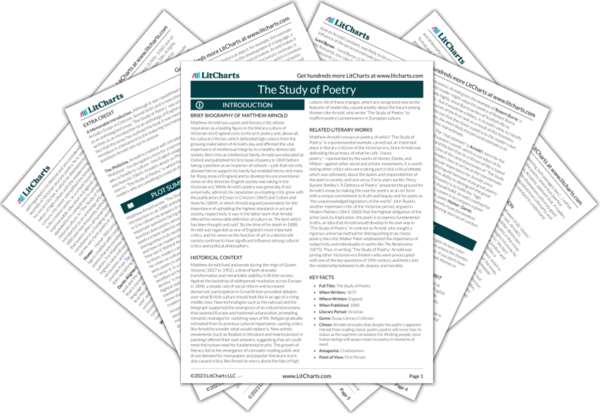“The Study of Poetry” was first published as Arnold’s introduction to an anthology of English poetry, and its primary purpose is to provide readers with a method for distinguishing what Arnold calls “classic” poetry from poetry that is merely good or—worse—inferior. Underlying Arnold’s project in this essay is the idea that poetry has something special to offer readers and a special role in human affairs, which Arnold describes as poetry’s high destiny.
Arnold’s reverence for poetry and its virtues might seem extreme to modern readers: he asserts boldly that poetry is destined to be the supreme “consolation” for human beings, who will “turn to poetry to interpret life for us, to console us, to sustain us.” While Arnold is deliberately vague about what qualities “classic” poetry has that give it this unique power, as well as about how, exactly, poetry provides people with such rewarding “consolation,” it is clear from his argument that he views poetry as fulfilling a vital function that science, religion, and philosophy cannot perform.
To that end, Arnold notes that our world is increasingly governed by facts. Science advances with the gathering of facts and tends to expand into more and more areas of human life. According to Arnold, even religion and philosophy, which formerly nurtured “ideas,” now offer little more than “reasonings” to people. Arnold argues that poetry will fill the gap formed by these receding institutions: “Without poetry, our science will appear incomplete; and most of what now passes with us for religion will be replaced by poetry.” In this way, Arnold makes it clear that there are strivings of the human spirit that only poetry can support and that, furthermore, this support is therapeutic. Arnold’s essay is shot through with a nostalgia and melancholia, and readers will rightly note that Arnold seems to view poetry as a balm for his own misgivings about the modern world. This forlorn aspect produces the essay’s final prediction that poetry will remain extremely important simply because human beings have “the instinct of self-preservation” and will inevitably need to turn to poetry for its invaluable and sustaining properties.
Poetry and the Human Spirit ThemeTracker

Poetry and the Human Spirit Quotes in The Study of Poetry
‘The future of poetry is immense, because in poetry, where it is worthy of its high destinies, our race, as time goes on, will find an ever surer and surer stay. There is not a creed which is not shaken, not an accredited dogma which is not shown to be questionable, not a received tradition which does not threaten to dissolve.’
In the present work it is the course of one great contributory stream to the world-river of poetry that we are invited to follow. We are here invited to study the stream of English poetry. But whether we set ourselves, as here, to follow only one of the several streams that make the mighty river of poetry, or whether we seek to know them all, our governing thought should be the same. We should conceive of poetry worthily, and more lightly that it has been the custom to conceive of it.
More and more mankind will discover that we have to turn to poetry to interpret life for us, to console us, to sustain us. Without poetry, our science will appear incomplete; and most of what now passes with us for religion and philosophy will be replaced by poetry. Science, I say, will appear incomplete without it. For finely and truly does Wordsworth call poetry ‘the impassioned expression which is in the countenance of all science.’
But if [the poet] is a real classic, if his work belongs to the class of the very best (for this is the true and right meaning of the word classic, classical), then the great thing for us is to feel and enjoy his work as deeply as ever we can, and to appreciate the wide difference between it and all work which has not the same high character. This is what is salutary, this is what is formative; this is the great benefit to be got from the study of poetry.
We are often told that an era is opening in which we are to see multitudes of a common sort of readers, and masses of a common sort of literature; that such readers do not want and could not relish anything better than such literature, and that to provide it is becoming a vast and profitable industry. Even if good literature entirely lost currency with the world, it would still be abundantly worth while to continue to enjoy it by oneself. But it never will lose currency with the world, in spite of momentary appearances; it never will lose supremacy. Currency and supremacy are insured to it… by the instinct of self-preservation in humanity.











